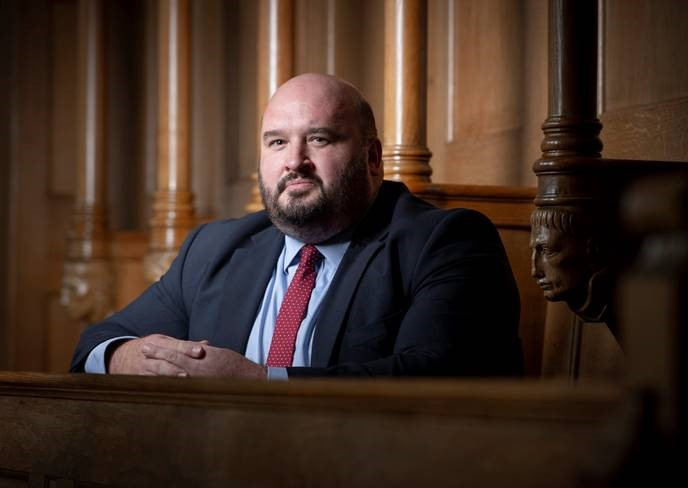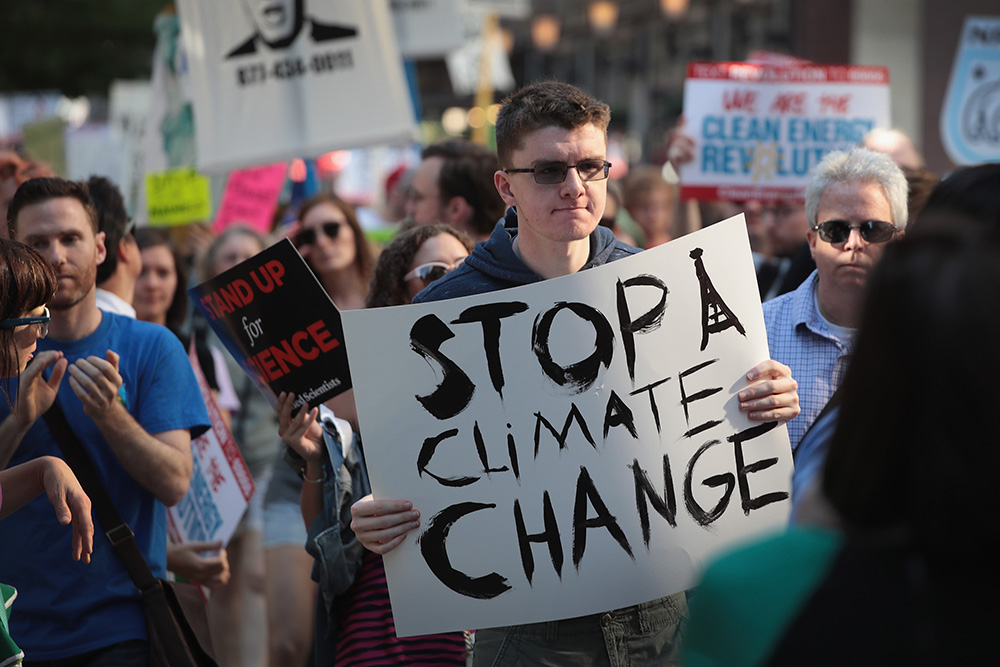
今年2月一个星期二的早晨,当爱德华·梅森走上讲台,面对台下的石油和天然气公司高管时,他的出现并不让人感到意外。梅森身材瘦小、牙齿有缝,是英国圣公会委员会(也即圣公会主要投资机构)负责任投资部门的主管。
梅森和他的同事、英国圣公会养老金委员会道德与参与部门主任亚当·马修斯经常会出席此类活动(这次是一年一度在伦敦举办的国际石油周),还有其他所有涉及气候变化问题和全球各大石油和天然气公司的活动。在这个冬日的早晨,梅森上台介绍了英国圣公会最新的投资政策,并提出了警告。
“你们都注意到了资产剥离的运动。”他指的是一些大型投资机构正在努力撤资石油公司,以及其他被视为气候变化罪魁祸首的行业。梅森说,圣公会希望“看到变化”,但终止投资并不是实现这一目标的最佳途径。相反,他对台下的高管表示,“我们会竭尽全力,让你们参与到解决气候变化问题的进程中去。”而同时,圣公会的耐心也是有限的。如果哪家公司拒不同意大幅减少排放,教会将别无选择,只能改变政策。
乍一看,梅森的话似乎只是空头威胁。圣公会坦言在石油和天然气行业的持股量较少,因此在经济上失去教会的支持并不会让行业感到恐慌。但英国圣公会确实有一件法宝能引起能源公司首席执行官的注意:影响力。
梅森和马修斯代表的机构投资者掌握了超过40万亿美元的资金,他们负责牵头就气候变化问题与全球最大的能源公司接触。因此,圣公会备受关注,并被认为促使了公众和机构对能源行业施加巨大减排压力。
两人已经取得了不少进展:就在梅森出席国际石油周前不久,英国能源巨头英国石油公司宣布要在2050年之前实现“净零排放”目标,也即尽可能地减少排放,然后利用其他方式抵消剩余的排放量。4月16日,总部位于荷兰的壳牌公司也做出了相同的承诺,成为全球最大一家做出该承诺的能源公司。此外,壳牌公司还在新闻稿中引用了马修斯的话。
这些成就被一场比气候变化更迫在眉睫的危机所掩盖了,那就是新冠肺炎大流行。尽管梅森和马修斯也对疫情感到担忧,但他们仍把注意力放在了另一个长期的挑战上。这个挑战远在大洋彼岸,而且迄今为止,事实证明这家公司比它的欧洲同行更加难以改变。它就是埃克森美孚公司。
4月24日,圣公会宣布会在埃克森的股东大会上,与其他关注气候问题的强大投资者一起,对整个董事会进行抗议性投票。此前,尽管结果可能并不如人意,但圣公会多次试图让这家总部位于美国的石油巨头采取相关举措。而此番声明表明,圣公会的努力又上了一个台阶。这是两家机构最新的一次较量,但可以肯定的是,这绝不会是最后一次。
“毁灭上帝的世界”
英国圣公会拥有486年历史,其中一位大主教曾任石油公司高管,最高首脑则是英国女王伊丽莎白二世。圣公会似乎不太可能在气候变化问题上扮演重要角色。毕竟,应对气候变化几乎已经成了格蕾塔·通贝里这类“环保少女”的代名词,而教会仅仅为了吸引年轻人入教都费尽了心思。
更何况,圣公会似乎不仅是另一个时代的产物,它的财力也十分有限。它旗下所有的基金掌握着约140亿英镑(约合1233亿元人民币)资产,是世界上最大的宗教投资机构之一。但与大型机构养老基金和资产管理公司相比,这个数字仍显得微不足道。例如截至今年3月31日,圣公会经常与之合作的瑞典国家养老基金AP7,其在股票基金和固定收益基金方面管理着约546亿美元(约合3867亿元人民币)资金。

此外,圣公会持有的石油和天然气公司股份也相对较小。教会的养老基金在整个石油和天然气行业持有1620万英镑(约合1.42亿元人民币)普通股,圣公会委员会基金则没有披露投资该行业的确切数字。英国石油公司和壳牌公司均被列为教会持有的最有价值的20只股票之一。
考虑到这些限制,圣公会对石油和天然气行业的影响力更为令人惊讶。它之所以能享有话语权,一个原因是其他大型投资机构要兼顾各个利益相关方和优先事项,但圣公会可以把应对气候变化当作工作重心。从2014年起,圣公会委员会开始在年报中将应对气候变化列为负责任投资的重点。而在2017年,圣公会联合创立了“过渡路径行动”,这家设在伦敦政治经济学院的中心将帮助资产管理公司追踪各公司应对气候变化的政策。今年2月,圣公会把这一战略推广到了自家业务,承诺将在2030年前使成千上万座阴冷古老的教堂和大教堂实现碳中和。
圣公会代表的不仅有自己的基金,还有其他财力雄厚的投资机构,通过牵头努力来提高自己的影响力。它代表了机构投资团体“气候行动100+”,和其他投资机构共同牵头,与英国石油公司、壳牌公司和埃克森美孚进行接触。“气候行动100+”的成员包括贝莱德公司,团体共掌握价值40万亿美元的资产,并明确致力于改变各公司的气候政策。
关注气候变化的投资团体认为,圣公会是践行这种合作方式的先行者,特别是在与石油公司就减排目标和游说活动直接接触时,圣公会起到了开拓性的作用。Boston Trust Walden是一家专门从事ESG资产管理的公司,其ESG股东参与部门主任蒂莫西·史密斯曾担任美国不同宗教信仰者间共同责任中心执行董事。他表示,英国圣公会在2018年与AP7合作,公开指出多家欧洲公司在幕后游说反对制定应对气候变化政策,这为他们在美国开展类似行动带来了启发。史密斯说:“其他人都没有行动,而他们却这么做了。”对于越来越多将气候变化问题作为投资组合重心的投资机构而言,圣公会的做法为它们提供了一种模式。
由联合国支持的Principles for Responsible Investing组织首席执行官菲奥娜·雷诺兹指出:“他们完成了超出自己能力的事。”该组织也是“气候行动100+”的成员。
圣公会之所以能在应对气候变化投资领域发挥巨大作用,除了策略以外,梅森和马修斯认为这也归功于一些世俗投资机构不具备的品质:道德责任感。像贝莱德这样的公司必须仔细论证气候政策在财务风险和回报方面的合理性,但圣公会设有一个由投资顾问和宗教领袖组成的理事会,可以在财务和神学方面提供支持。
正如史密斯所说:“用宗教术语来说,他们担心上帝的世界会遭到深层的毁灭,这种情况将会发生,而且现在就已经发生了。”
“以前差距很大,现在反而更大了”
尽管欧洲主要能源公司似乎终于改变了气候相关的政策,但在大西洋彼岸,美国最大的石油和天然气上市公司埃克森美孚依旧是圣公会需要讨伐的对象。
埃克森美孚通常被视为美国石油和天然气行业的领头羊,但它规模极其庞大,影响力远远超出了其位于得克萨斯州欧文的公司总部。它是仅次于壳牌和英国石油公司的全球第三大石油和天然气上市公司,业务遍布6大洲45个国家,2019年营收额和其他收入总和近2650亿美元。埃克森美孚的任何政策转变,不仅会代表美国能源行业的重要转折点,也可能成为一个契机,迫使其他大公司也走上同样的道路。

2017年,圣公会在埃克森年度股东大会上提交了一份股东议案,要求公司披露气候变化对业务产生的影响。该议案以62%的股东票数获得通过。自2018年以来,埃克森每年都会公布《能源和碳摘要》报告,说明气温上升对业务的影响。
此后,圣公会开始与埃克森公司直接接触。2018年,梅森与纽约州共同养老基金合作,代表“气候行动100+”直接与该公司对话。由于私下谈话鲜有进展,圣公会开始通过公开场合发声,试图在公司年度股东大会上就气候政策问题提出股东议案。
但自2017年以来,圣公会的做法只取得了有限的进展。新的股东议案要么无法通过,要么在美国证交会的支持下被剔除在了代理投票表决议题之外。今年,英国圣公会的一项提案要求埃克森美孚设定与《巴黎气候协定》相一致的减排目标,但这项议案已经连续第二年遭到否决。其他投资者就气候政策和游说内幕披露事宜提出的议案虽然进入了投票环节,但至今未能获得多数赞同。梅森在今年2月表示,“气候行动100+”仍在与埃克森公司合作,“但我们对听到的消息并不满意”。
到了今年4月,双方的关系似乎愈发紧张。4月24日,圣公会和纽约州共同养老基金宣布,它们将在5月的年度股东大会上投票反对埃克森美孚董事会,以此抗议该公司的气候政策,并敦促其他股东也一起投票反对。
埃克森美孚则否认自己拒不对气候变化采取行动。在回应圣公会指责其在气候问题上不愿让步时,它提供了一份应对气候变化政策的摘要。该公司并未直接回应英国圣公会或其他批评者,也没有确认是否加入了“气候行动100+”。公司表示自己致力于遵守《巴黎协定》并与之保持一致,在政治献金方面也做到了公开透明。它在今年3月表示,公司在2017至2020年间的甲烷排放减少了20%。据国际能源署的数据显示,这种强大的温室气体占到全球能源相关排放的6%。
埃克森美孚还指出,它有充分理由否决圣公会和其他投资者就气候政策提出的议案。今年,该公司就圣公会提出的排放目标议案向美国证交会发表声明,称该议案被搁置是因为它“虚假且有误导性”。议案企图对埃克森美孚进行微观管理,而这其实没有必要,因为公司已经“在实质上实行了”减少排放的提案。
一些ESG专家表示,圣公会在与英国石油、壳牌公司等欧洲石油巨头打交道时成效显著,但却无法与埃克森美孚达成一致,这在很大程度上取决于政治因素,尤其是美国和欧洲在气候变化问题上存有巨大分歧。
牛津大学赛德商学院副研究员、该校社会融资和影响力投资项目联合主任盖尔·彼得森认为,投资者在这个问题上的立场通常“反映了当地的政治倾向”。Principles for Responsible Investing的菲奥娜·雷诺兹则表示,对美国和欧洲的大企业而言,“它们的观念完全不同”,而且欧洲各国政府在制定气候变化政策方面遥遥领先。

2019年底,特朗普政府正式宣布美国将退出《巴黎协定》。此前,特朗普首次于2017年承诺将退出该协定。与此同时,英国和欧盟各国政府参与应对气候变化的意愿要强得多。英国和欧盟都目标在2050年前实现净零排放。马修斯表示,随着壳牌公司在今年4月做出同样的承诺,美国和欧洲的差距越来越大:“以前差距很大,现在反而更大了。”
如今,还有一个因素使得向埃克森美孚等行动迟缓的公司施压的努力变得更加复杂:新冠肺炎大流行。据国际能源署称,今年全球石油需求量可能会因为封城措施减少930万桶/天——而且前提是2020年下半年开始需求有所恢复。
虽然需求疲软可能在短期内遏制温室气体排放,但这也威胁到了能源公司的财务健康,即使是最大的公司也承诺减产,并宣布了停薪休假和裁员计划。英格兰银行前行长马克·卡尼在今年3月警告称,广泛的经济影响(更不用说世界各国转而抗击疫情所带来的干扰),有可能会减少资金投入和减排运动的紧迫性。国际能源署执行干事法提赫·比罗尔则表示,这场危机其实是对全球各家企业是否会兑现承诺、继续应对气候变化的一场考验。
不过在今年2月,早在新冠大流行来袭或壳牌公司宣布净零目标之前,梅森就警告说,在气候变化和商业问题上,世界正在迅速变化。
他表示:“埃克森美孚自欺欺人,说什么‘啊呀,一切都会和以前一样的’,但事实并非如此。”(财富中文网)
译者:智竑
今年2月一个星期二的早晨,当爱德华·梅森走上讲台,面对台下的石油和天然气公司高管时,他的出现并不让人感到意外。梅森身材瘦小、牙齿有缝,是英国圣公会委员会(也即圣公会主要投资机构)负责任投资部门的主管。
梅森和他的同事、英国圣公会养老金委员会道德与参与部门主任亚当·马修斯经常会出席此类活动(这次是一年一度在伦敦举办的国际石油周),还有其他所有涉及气候变化问题和全球各大石油和天然气公司的活动。在这个冬日的早晨,梅森上台介绍了英国圣公会最新的投资政策,并提出了警告。
“你们都注意到了资产剥离的运动。”他指的是一些大型投资机构正在努力撤资石油公司,以及其他被视为气候变化罪魁祸首的行业。梅森说,圣公会希望“看到变化”,但终止投资并不是实现这一目标的最佳途径。相反,他对台下的高管表示,“我们会竭尽全力,让你们参与到解决气候变化问题的进程中去。”而同时,圣公会的耐心也是有限的。如果哪家公司拒不同意大幅减少排放,教会将别无选择,只能改变政策。
乍一看,梅森的话似乎只是空头威胁。圣公会坦言在石油和天然气行业的持股量较少,因此在经济上失去教会的支持并不会让行业感到恐慌。但英国圣公会确实有一件法宝能引起能源公司首席执行官的注意:影响力。
梅森和马修斯代表的机构投资者掌握了超过40万亿美元的资金,他们负责牵头就气候变化问题与全球最大的能源公司接触。因此,圣公会备受关注,并被认为促使了公众和机构对能源行业施加巨大减排压力。
两人已经取得了不少进展:就在梅森出席国际石油周前不久,英国能源巨头英国石油公司宣布要在2050年之前实现“净零排放”目标,也即尽可能地减少排放,然后利用其他方式抵消剩余的排放量。4月16日,总部位于荷兰的壳牌公司也做出了相同的承诺,成为全球最大一家做出该承诺的能源公司。此外,壳牌公司还在新闻稿中引用了马修斯的话。
这些成就被一场比气候变化更迫在眉睫的危机所掩盖了,那就是新冠肺炎大流行。尽管梅森和马修斯也对疫情感到担忧,但他们仍把注意力放在了另一个长期的挑战上。这个挑战远在大洋彼岸,而且迄今为止,事实证明这家公司比它的欧洲同行更加难以改变。它就是埃克森美孚公司。
4月24日,圣公会宣布会在埃克森的股东大会上,与其他关注气候问题的强大投资者一起,对整个董事会进行抗议性投票。此前,尽管结果可能并不如人意,但圣公会多次试图让这家总部位于美国的石油巨头采取相关举措。而此番声明表明,圣公会的努力又上了一个台阶。这是两家机构最新的一次较量,但可以肯定的是,这绝不会是最后一次。
“毁灭上帝的世界”
英国圣公会拥有486年历史,其中一位大主教曾任石油公司高管,最高首脑则是英国女王伊丽莎白二世。圣公会似乎不太可能在气候变化问题上扮演重要角色。毕竟,应对气候变化几乎已经成了格蕾塔·通贝里这类“环保少女”的代名词,而教会仅仅为了吸引年轻人入教都费尽了心思。
更何况,圣公会似乎不仅是另一个时代的产物,它的财力也十分有限。它旗下所有的基金掌握着约140亿英镑(约合1233亿元人民币)资产,是世界上最大的宗教投资机构之一。但与大型机构养老基金和资产管理公司相比,这个数字仍显得微不足道。例如截至今年3月31日,圣公会经常与之合作的瑞典国家养老基金AP7,其在股票基金和固定收益基金方面管理着约546亿美元(约合3867亿元人民币)资金。
此外,圣公会持有的石油和天然气公司股份也相对较小。教会的养老基金在整个石油和天然气行业持有1620万英镑(约合1.42亿元人民币)普通股,圣公会委员会基金则没有披露投资该行业的确切数字。英国石油公司和壳牌公司均被列为教会持有的最有价值的20只股票之一。
考虑到这些限制,圣公会对石油和天然气行业的影响力更为令人惊讶。它之所以能享有话语权,一个原因是其他大型投资机构要兼顾各个利益相关方和优先事项,但圣公会可以把应对气候变化当作工作重心。从2014年起,圣公会委员会开始在年报中将应对气候变化列为负责任投资的重点。而在2017年,圣公会联合创立了“过渡路径行动”,这家设在伦敦政治经济学院的中心将帮助资产管理公司追踪各公司应对气候变化的政策。今年2月,圣公会把这一战略推广到了自家业务,承诺将在2030年前使成千上万座阴冷古老的教堂和大教堂实现碳中和。
圣公会代表的不仅有自己的基金,还有其他财力雄厚的投资机构,通过牵头努力来提高自己的影响力。它代表了机构投资团体“气候行动100+”,和其他投资机构共同牵头,与英国石油公司、壳牌公司和埃克森美孚进行接触。“气候行动100+”的成员包括贝莱德公司,团体共掌握价值40万亿美元的资产,并明确致力于改变各公司的气候政策。
关注气候变化的投资团体认为,圣公会是践行这种合作方式的先行者,特别是在与石油公司就减排目标和游说活动直接接触时,圣公会起到了开拓性的作用。Boston Trust Walden是一家专门从事ESG资产管理的公司,其ESG股东参与部门主任蒂莫西·史密斯曾担任美国不同宗教信仰者间共同责任中心执行董事。他表示,英国圣公会在2018年与AP7合作,公开指出多家欧洲公司在幕后游说反对制定应对气候变化政策,这为他们在美国开展类似行动带来了启发。史密斯说:“其他人都没有行动,而他们却这么做了。”对于越来越多将气候变化问题作为投资组合重心的投资机构而言,圣公会的做法为它们提供了一种模式。
由联合国支持的Principles for Responsible Investing组织首席执行官菲奥娜·雷诺兹指出:“他们完成了超出自己能力的事。”该组织也是“气候行动100+”的成员。
圣公会之所以能在应对气候变化投资领域发挥巨大作用,除了策略以外,梅森和马修斯认为这也归功于一些世俗投资机构不具备的品质:道德责任感。像贝莱德这样的公司必须仔细论证气候政策在财务风险和回报方面的合理性,但圣公会设有一个由投资顾问和宗教领袖组成的理事会,可以在财务和神学方面提供支持。
正如史密斯所说:“用宗教术语来说,他们担心上帝的世界会遭到深层的毁灭,这种情况将会发生,而且现在就已经发生了。”
“以前差距很大,现在反而更大了”
尽管欧洲主要能源公司似乎终于改变了气候相关的政策,但在大西洋彼岸,美国最大的石油和天然气上市公司埃克森美孚依旧是圣公会需要讨伐的对象。
埃克森美孚通常被视为美国石油和天然气行业的领头羊,但它规模极其庞大,影响力远远超出了其位于得克萨斯州欧文的公司总部。它是仅次于壳牌和英国石油公司的全球第三大石油和天然气上市公司,业务遍布6大洲45个国家,2019年营收额和其他收入总和近2650亿美元。埃克森美孚的任何政策转变,不仅会代表美国能源行业的重要转折点,也可能成为一个契机,迫使其他大公司也走上同样的道路。
2017年,圣公会在埃克森年度股东大会上提交了一份股东议案,要求公司披露气候变化对业务产生的影响。该议案以62%的股东票数获得通过。自2018年以来,埃克森每年都会公布《能源和碳摘要》报告,说明气温上升对业务的影响。
此后,圣公会开始与埃克森公司直接接触。2018年,梅森与纽约州共同养老基金合作,代表“气候行动100+”直接与该公司对话。由于私下谈话鲜有进展,圣公会开始通过公开场合发声,试图在公司年度股东大会上就气候政策问题提出股东议案。
但自2017年以来,圣公会的做法只取得了有限的进展。新的股东议案要么无法通过,要么在美国证交会的支持下被剔除在了代理投票表决议题之外。今年,英国圣公会的一项提案要求埃克森美孚设定与《巴黎气候协定》相一致的减排目标,但这项议案已经连续第二年遭到否决。其他投资者就气候政策和游说内幕披露事宜提出的议案虽然进入了投票环节,但至今未能获得多数赞同。梅森在今年2月表示,“气候行动100+”仍在与埃克森公司合作,“但我们对听到的消息并不满意”。
到了今年4月,双方的关系似乎愈发紧张。4月24日,圣公会和纽约州共同养老基金宣布,它们将在5月的年度股东大会上投票反对埃克森美孚董事会,以此抗议该公司的气候政策,并敦促其他股东也一起投票反对。
埃克森美孚则否认自己拒不对气候变化采取行动。在回应圣公会指责其在气候问题上不愿让步时,它提供了一份应对气候变化政策的摘要。该公司并未直接回应英国圣公会或其他批评者,也没有确认是否加入了“气候行动100+”。公司表示自己致力于遵守《巴黎协定》并与之保持一致,在政治献金方面也做到了公开透明。它在今年3月表示,公司在2017至2020年间的甲烷排放减少了20%。据国际能源署的数据显示,这种强大的温室气体占到全球能源相关排放的6%。
埃克森美孚还指出,它有充分理由否决圣公会和其他投资者就气候政策提出的议案。今年,该公司就圣公会提出的排放目标议案向美国证交会发表声明,称该议案被搁置是因为它“虚假且有误导性”。议案企图对埃克森美孚进行微观管理,而这其实没有必要,因为公司已经“在实质上实行了”减少排放的提案。
一些ESG专家表示,圣公会在与英国石油、壳牌公司等欧洲石油巨头打交道时成效显著,但却无法与埃克森美孚达成一致,这在很大程度上取决于政治因素,尤其是美国和欧洲在气候变化问题上存有巨大分歧。
牛津大学赛德商学院副研究员、该校社会融资和影响力投资项目联合主任盖尔·彼得森认为,投资者在这个问题上的立场通常“反映了当地的政治倾向”。Principles for Responsible Investing的菲奥娜·雷诺兹则表示,对美国和欧洲的大企业而言,“它们的观念完全不同”,而且欧洲各国政府在制定气候变化政策方面遥遥领先。
2019年底,特朗普政府正式宣布美国将退出《巴黎协定》。此前,特朗普首次于2017年承诺将退出该协定。与此同时,英国和欧盟各国政府参与应对气候变化的意愿要强得多。英国和欧盟都目标在2050年前实现净零排放。马修斯表示,随着壳牌公司在今年4月做出同样的承诺,美国和欧洲的差距越来越大:“以前差距很大,现在反而更大了。”
如今,还有一个因素使得向埃克森美孚等行动迟缓的公司施压的努力变得更加复杂:新冠肺炎大流行。据国际能源署称,今年全球石油需求量可能会因为封城措施减少930万桶/天——而且前提是2020年下半年开始需求有所恢复。
虽然需求疲软可能在短期内遏制温室气体排放,但这也威胁到了能源公司的财务健康,即使是最大的公司也承诺减产,并宣布了停薪休假和裁员计划。英格兰银行前行长马克·卡尼在今年3月警告称,广泛的经济影响(更不用说世界各国转而抗击疫情所带来的干扰),有可能会减少资金投入和减排运动的紧迫性。国际能源署执行干事法提赫·比罗尔则表示,这场危机其实是对全球各家企业是否会兑现承诺、继续应对气候变化的一场考验。
不过在今年2月,早在新冠大流行来袭或壳牌公司宣布净零目标之前,梅森就警告说,在气候变化和商业问题上,世界正在迅速变化。
他表示:“埃克森美孚自欺欺人,说什么‘啊呀,一切都会和以前一样的’,但事实并非如此。”(财富中文网)
译者:智竑
By the time Edward Mason stepped up to the lectern in front of a crowd of oil and gas executives on a Tuesday morning in February, the presence of the slight, gap-toothed head of responsible investment at the Church Commissioners for England—the main investment vehicle of the Church of England—should not have come as a surprise.
Mason and his colleague Adam Matthews, director of ethics and engagement at the Church’s pension board, have become a regular presence at events like this one—the annual International Petroleum Week in London—and everywhere else climate change and the world’s largest oil and gas companies are discussed. On this winter morning, Mason was using his time on stage to provide an update on the Church’s investment policies—and to deliver a warning.
“You’ll all be aware of the divestment movement,” he said, referring to the push among some large investors to withdraw funds backing oil companies, and other sectors seen as major contributors to climate change. The Church wants “to see change”, said Mason, but does not believe that ending their investment is the best way to meet that goal. Instead, he told executives, “we will strain every sinew to help you become part of the solution to climate change.” At the same time, there’s a limit to the Church’s patience, says Mason. If companies do not get on board with dramatically reducing emissions, his organization will have no choice but to reverse its policy.
At first glance, Mason’s statement appears to be something of an empty threat. The Church admits its holdings in the oil and gas sector are relatively minor, so the possible loss of its financial backing does not exactly have the industry running scared. But the Church of England does have something that gets the attention of energy CEOs: influence.
Mason and Matthews lead engagement on climate change with the world’s biggest energy companies on behalf of a group of institutional investors representing over $40 trillion. As a result, the Church commands attention and has been credited with driving a wave of public and institutional pressure on the industry to cut emissions.
The pair have had some wins: shortly before Mason’s appearance at IP Week, British energy giant BP announced it would aim for ‘net zero’—meaning it would reduce emissions as much as possible, then offset the remainder—by 2050. On April 16, Royal Dutch Shell, based in the Netherlands, announced it had made the same commitment, becoming the largest energy company in the world to do so—and quoted Matthews in its press release.
That accomplishment was overshadowed by a crisis more immediate than climate change—the COVID-19 pandemic. But despite their concerns about the virus, Mason and Matthews are staying focused on another longterm challenge, one that lies on the other side of the ocean, and has so far proved more resistant to change than its European counterparts: ExxonMobil.
April 24, the Church's repeated, if not overly successful, efforts to bring that U.S.-based giant to heel ratcheted up a level when it announced on Friday that it, along with other powerful climate-focused investors, would issue a protest vote against Exxon's entire board at it's upcoming general meeting. It's the latest blow in the battle between the two institutions—but almost certainly not the last.
‘Destruction of God’s world’
The Church of England—a 486-year-old institution with a former oil executive for an Archbishop and Queen Elizabeth II at its head—might seem like an unlikely candidate to play the climate change heavy. After all, the movement to act on climate change has become all but synonymous with youth activists like Greta Thunberg, while the Church struggles to even coax young people through its doors.
And not only does the Church seem, at least at first glance, to be a relic from another age, but its financial firepower is also limited. With a total of roughly GBP 14 billion (or about $17.73 billion) under management across all of its funds, it’s one of the world’s largest religious investors—but remains a relative minnow compared to large institutional pension funds and asset managers. By comparison, a frequent collaborator—the national Swedish pension fund, AP7—had about $54.6 billion assets under management between its equity and fixed income funds as of March 31.
What’s more, its oil and gas holdings are also relatively modest. The Church’s pension fund holds GBP 16.2 million ($19.9 million) in common stock across the oil and gas sector as a whole, while its Church Commissioners fund doesn’t disclose exact figures for the sector; both BP and Shell are listed as among its top twenty most valuable equity holdings.
Given those limitations, the Church’s ability to command the attention of the oil and gas sector is all the more surprising. One of the ways it's managed to hold sway is by committing to make climate change a focus in a way other large investors, juggling multiple stakeholders and priorities, do not. From 2014 onwards, the Church Commissioners' annual reports listed climate change as a major responsible investing priority, and in 2017, the Church co-founded the Transition Pathway Initiative, a centre at the London School of Economics to help asset managers track companies’ climate change policies. In February, the Church expanded that strategy to its own operations, committing to make hundreds of thousands of drafty, ancient churches and cathedrals carbon neutral by 2030.
It’s also bolstered its clout by leading efforts not just on behalf of its own funds, but for other investors with far deeper pockets. The Church co-leads engagement efforts with other investors on BP, Shell, and ExxonMobil on behalf of Climate Action 100+, an institutional investor group that covers $40 trillion worth of assets, including BlackRock, and explicitly works to shift companies’ climate policies.
Climate investment groups credit the Church as a pioneer of this cooperative approach, particularly when it comes to engaging directly with oil companies on emissions reductions targets, and on their lobbying practices. A Church-led effort with AP7 to call out European companies’ behind-the-scenes lobbying against climate change policies, in 2018, provided the inspiration for a similar effort in the U.S., says Timothy Smith, director of ESG shareowner engagement at Boston Trust Walden, an ESG-specialized asset manager, and former executive director at the U.S.-based Interfaith Center on Corporate Responsibility. “They did this when nobody else was doing it,” he says. And more broadly, the Church’s approach has provided a model for a growing number of investors that are beginning to put climate change at the center of their portfolios.
“They very much punch above their weight,” says Fiona Reynolds, CEO of the UN-backed Principles for Responsible Investing, which is also a member of Climate Action 100+.
Beyond tactics, Mason and Matthews attribute the Church’s outsized role in climate change investment to having something secular investors do not: a moral imperative. While companies like BlackRock must carefully justify their climate policies in terms of financial risk and reward, the Church has a council of investment advisors and religious leaders to provide both the financial and theological backing to its approach.
As Smith puts it: “To use religious terms: they’re worried about the deep destruction of God’s world, that will occur—and is occurring.”
‘The gap was large, and now it’s even larger.’
But while major European energy companies appear to finally be shifting their climate-related policies, across the Atlantic, America's largest publicly traded oil and gas company, ExxonMobil, has been—and remains—the Church’s white whale.
The company is often treated as a bellwether for the U.S. oil and gas sector as a whole, but its sheer scale gives it influence far beyond its headquarters in Irving, Texas. After Shell and BP, it is the third largest publicly traded oil and gas company in the world, operating in 45 countries on six continents, and pulling in nearly $265 billion in revenue and other income in 2019. Any shifts in Exxon’s policies wouldn't just represent a major pivot in the future of U.S. energy—but could be a tipping point that would force other major companies to follow the same path.
In 2017, a shareholder proposal brought by the Church to Exxon's annual general meeting to force the company to disclose the impact of climate change on its business passed with 62% of the shareholder vote. Since 2018, Exxon has released annual "Energy and Carbon Summary" reports on how rising temperatures will impact its business.
The Church followed that win with engagement directly with Exxon, when Mason began speaking directly to the company in 2018 on behalf of Climate Action 100+, working with the New York State Common Retirement Fund. With little sign of progress from its private conversations, the Church has also continued to use the public route, attempting to introduce shareholder proposals on climate policy at the company’s Annual General Meetings.
But since 2017, the approach has only gained limited ground, with further shareholder proposals either failing to pass, or being struck off the proxy ballot with the backing of the SEC. This year, a Church of England proposal asking the company to set emissions reduction targets consistent with the Paris Climate Agreement was struck from the ballot for the second consecutive year. Other climate-related proposals on climate policies and lobbying disclosures brought by other investors have made it to the ballot, but have so far failed to gain a majority vote. In February, Mason said Climate Action 100+ is still engaging with Exxon, “but we’re not happy with what we’re hearing.”
By April, that relationship appeared increasingly tense. On April 24, the Church and the New York Common State Retirement Fund announced they would vote against Exxon's full board at its Annual General Meeting in May—in protest over the company's climate policies—and urged other shareholders to do the same.
Exxon, for its part, denies being a climate change holdout. In a response to the Church’s description of a company that refuses to budge on the subject, Exxon provided a summary of its policies on climate change; it did not address the Church of England or other critics directly, and did not confirm that it engages with Climate Action 100+. The company says it is committed to and aligned with the Paris Agreement, and is transparent about political donations. In March, the company said it had reduced its methane emissions—a potent greenhouse gas that the International Energy Agency says is equal to 6% of global energy-related emissions—by 20% between 2017 and 2020.
Exxon also says it had good reasons for striking down shareholder proposals brought by the Church and other investors on its climate policies. In its statement to the SEC this year on the Church’s proposal on emissions targets, the company said the proposal was dropped because it was “false and misleading”, sought to micromanage the company, and was ultimately unnecessary, since the company had already “substantially implemented” the proposal to cut emissions.
The question of why the Church, so effective when engaging with European giants like BP and Shell, has failed to find traction with Exxon largely comes down to politics, say ESG experts—and specifically the gaping divide between the U.S. and Europe on the subject of climate change.
Investors’ stance on the issue tends to “mirror the politics of that place,” says Gayle Peterson, an associate fellow at the University of Oxford’s Saïd Business School, and co-director of its social finance and impact investing programs. For major corporations in the U.S. versus Europe, “there’s a very different mindset,” says Fiona Reynolds, of PRI, adding that European governments are much further ahead on climate change policy.
In late 2019, the Trump Administration gave official notice it would pull out of the Paris Agreement, after first promising to leave the accord in 2017. Meanwhile, the governments of the U.K. and EU have been far more willing to engage with the issue; both are targeting net zero emissions by 2050. And with Shell’s April commitment to do the same, the U.S. and Europe have drifted even further apart, says Matthews: “The gap was large, and now it’s even larger.”
Now, there’s yet another factor complicating the efforts to pressure Exxon and other companies flagged as climate laggards: the coronavirus pandemic. The International Energy Agency says demand for oil due to global lockdowns is likely to drop by 9.3 million barrels per day this year—and that’s assuming demand starts to recover in the second half of 2020.
While anemic demand is likely to curb emissions in the short term, it also threatens the financial health of energy companies, with even the largest pledging production cuts and announcing furloughs and layoffs. The broad economic fallout—not to mention the distraction, as the world pivots to focus on combating the virus—risks reducing the capital and urgency driving the movement to reduce emissions, former Bank of England governor Mark Carney warned in March. Indeed, this crisis represents a test of whether companies worldwide will even stick to the climate commitments they've already made, said the IEA's executive director, Fatih Birol.
But in February, even before the arrival of the coronavirus pandemic or the announcement of Shell’s new net zero target, Mason warned when it comes to climate change and business, the world is changing very fast.
“Exxon has its fingers in its ears, and is saying, you know, ‘la, la, la, things are going to be the same as they’ve always been’,” he said. “And they’re not.”






